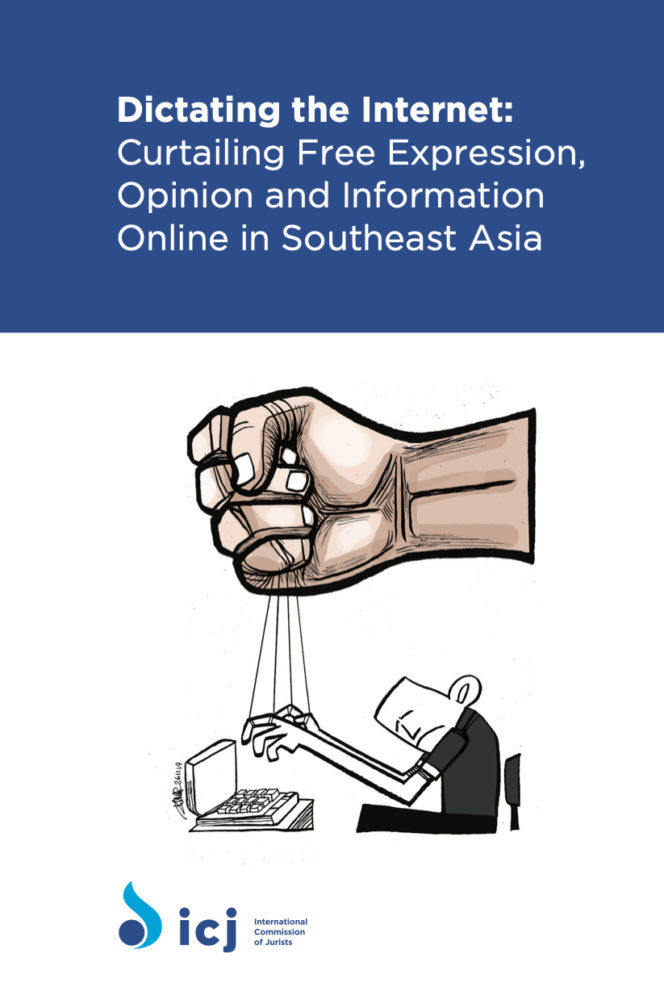12 Dec, 2019
Southeast Asia: Jurists launch report on increasing restrictions on online speech
Bangkok, December 11, 2019 — The Geneva-based International Commission of Jurists (ICJ) today launched its report Dictating the Internet: Curtailing Free Expression, Opinion and Information Online in Southeast Asia at the Foreign Correspondents’ Club of Thailand (FCCT).
 |
This trend is not new. Southeast Asian governments have, for decades, crafted and enforced the law to curtail expression and information.
Laws enacted before the internet era – including those prohibiting defamation, lèse-majesté, sedition, contempt of court or crimes against the State – have been repurposed or supplemented to censor expression and information online.
More recent laws that have been introduced purportedly to regulate information online, control the spread of disinformation, ensure cybersecurity and justify internet shutdowns have been used for the same aims.
Multiple commonalities are evident in these legal frameworks. They commonly include:
(+) Vague, overbroad legal provisions;
(+) Severe and disproportionate penalties;
(+) Lack of independent oversight mechanisms; and
(+) Failure to provide effective remedy or accountability.
Conceptions of “national security” and “public order” have been conflated with the perceived interests of the ruling government or other powerful interests to target specific expression.
Emerging laws allow for extraterritorial application, and in some cases, seek to extend their reach beyond public expression, to private communications.
These frameworks do not advance legitimate aims or do not do so in accordance with applicable principles of legitimacy, necessity and proportionality, in violation of international law.
The report concludes by reasserting that international human rights law not only remains relevant, but that its application is needed, now more than ever in the digital age, to protect the exercise of rights online as well as offline.
The report argues that respect for human rights is essential for ensuring that all members of the global community can fully enjoy and exercise their freedom of expression, opinion and information, and that legislation framed in human rights terms is also the best and most effective way to protect against the very real threats posed by the spread of hate speech, disinformation online, cyber-attacks and other cybercrimes.
It calls for States in Southeast Asia to repeal, amend or otherwise rectify existing legal and regulatory frameworks to bring them in line with their international obligations.
The report launch included a panel discussion, which drew together human rights defenders, artists, journalists, lawyers and civil society who spoke to their experiences of being targeted by governments for their activities online, and about the impact of new laws and policies being enacted in the region to police expression on social media and through other new technologies.
The discussion was moderated by Gwen Robinson, editor-at-large of Nikkei Asian Review and President of the FCCT, and included as panelists:
- Frederick Rawski, ICJ Asia and the Pacific Director
- Ma Thida, Burmese surgeon, writer, human rights activist and former political prisoner
- Zunar, Malaysian political cartoonist
- Jolovan Wham, Singaporean civil and labour rights activist
- Sutharee Wannasiri, Thai human rights activist
Round-table discussion
Before the report launch, the ICJ conducted a closed-door roundtable discussion on ‘Enhancing protection of human rights online in Southeast Asia’ at the Sukosol Hotel in Bangkok.
The discussion brought together experts, advocates and researchers working in the Information and Communications Technology (ICT) and human rights sectors to identify key challenges faced in ensuring human rights protections online, and preliminarily consider potential policy solutions towards ensuring greater protections.
15 representatives from the private and civic tech sectors, digital rights advocates, civil society and researchers focused on the intersection between human rights protection and ICT participated in the discussion.
Download
Southeast Asia-Dictating the Internet-Publications-Reports-Thematic reports-2019-ENG




Liked this article? Share it!